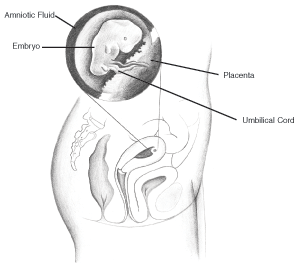Pregnancy: Weeks 1-6
Pregnancy: Weeks 1-6
The development of a baby in 40 weeks is an amazing thing. There's something new happening every week!
 A human embryo at six weeks. At this time, your baby will weigh 1/1,000 of an ounce and be ¼ inch long. |
Week Number 1
You're not pregnant. This is the week of the start of your period. As the uterus sheds its lining and causes bleeding, the hormones are preparing another egg for release.
Week Number 2
You're still not pregnant. The uterine lining is thickening and ovulation (the release of an egg) is getting ready to occur. You might feel a twinge of pain as ovulation occurs.
Week Number 3
This could be the week! When an egg is released into your fallopian tube, it meets up with your partner's sperm. (During the average ejaculation 350 million sperm have a chance at making the trip into the fallopian tube. The ones that make it will wait there for an egg for as long as four days.) When the sperm penetrates an egg, fertilization (conception) occurs. The fertilized egg is called a zygote. Immediately the egg begins dividing into identical cells as it floats down the fallopian tube to the uterus. Now you're pregnant.
Week Number 4
Baby Talk
The fertilized egg is called a zygote. When the zygote finds its nesting place in the uterus, it is called a blastocyst.
There's lots of action going on that you're completely unaware of. Your little zygote finds its nesting place in the uterus and is now called a blastocyst. When in the uterus, it divides in half: one-half sticks to the uterine wall and becomes the placenta (the life-support system that brings nourishment into your baby and takes waste out). The other half will become the baby. Transvaginal ultrasound (which is an ultrasound in which a small probe is placed into the vagina, giving a very close look inside the uterus) shows a gestational sac (a small circle that will become the baby's home). By the end of this week, you will have missed your period, giving you the first sign that something's up. Some women see a slight spotting called implantation bleeding that happens when the blastocyst nestles into the uterine wall.
Week Number 5
At this point a pregnancy test can confirm the pregnancy. Your baby is about the size of an apple seed and is now called an embryo and has a beating heart of its own. The placenta and the umbilical cord are in full operation. You would be shocked to see how rapidly your baby is developing:
- The head and the tail folds are distinct.
- The primary brain vesicles form.
- The nervous system begins to develop.
- Two heart tubes are fused in the midline and begin to contract.
Pregnancy Facts
Organogenesis is the period of time that the fetus's important organs are developing. This begins at 6 weeks and extends to 10 weeks. It is during this period that the fetus is most at risk from birth defects caused by external factors (such as drugs and other toxins).
Week Number 6
Your little embryo is dropping its calling card. This is the week the physical sensations of pregnancy usually appear: nausea, sore breasts, fatigue, and frequent urination are all signs of this incredible growth process. The embryo looks more like a tadpole than a human, but the body is growing rapidly:
- The head, tail, and arm buds are easily recognizable.
- The optic vesicles and lenses form.
- Limb buds are present.
- The earliest form of the liver, pancreas, lungs, thyroid gland, and heart appear.
- Blood circulation is well established. The heart bulges from the body.
- The cerebral brain hemispheres are enlarging.
- In the stomach area, the primary intestinal loop is present.
In these few weeks in the first month of pregnancy so much is happening. Just because you don't see your belly growing yet, don't be fooled into thinking there's nothing going on that needs medical attention. Don't let this first month go by without a visit to your health-care provider.
Continue to Weeks 7-10